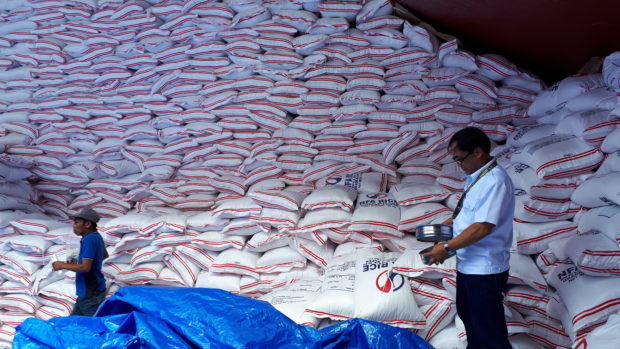Rice tariffication starts on March 3

This photo, taken in August 2018, shows an official from the National Food Authority taking samples of rice imported from Thailand inside MV Emperor 1, which was docked at the Tabaco City port. Starting on March 3, 2019, the government will start imposing tariffs on imported rice. (Photo by MICHAEL B. JAUCIAN / Inquirer Southern Luzon)
The government will slap tariffs on imported rice beginning March 3 with the import quota removed under the Rice Tariffication Act (Republic Act No. 11203), which President Rodrigo Duterte signed last week.
Finance Assistant Secretary Antonio Joselito G. Lambino II said the following tariff rates will apply under the new law:
- 35 percent if rice was imported from a member country of the Association of Southeast Asian Nations
- 40 percent if it’s within the minimum access volume (MAV) of 350,000 metric tons and coming from a non-Asean country
- 180 percent if it’s above the MAV and coming from a non-Asean country
In a meeting led by Finance Secretary Carlos G. Dominguez on Monday, the interagency National Food Authority (NFA) Council also ordered the NFA to submit a restructuring plan within 30 days, as the law had removed its commercial function and regulatory powers, only retaining its emergency buffer stocking mandate.
In a statement, the Department of Finance (DOF) said Dominguez presided over the meeting as Agriculture Secretary Emmanuel Piñol, who chairs the NFA Council, was “unavailable.”
The meeting tackled the crafting of the implementing rules and regulations of RA 11203, while also shooting down the earlier proposal of the NFA to submit a restructuring plan within a longer period of 180 days.
Article continues after this advertisement“Our objective in liberalizing rice imports is to bring down the costs of the staple,” Dominguez said. “Our price is 50 percent higher than the others, including Singapore, which does not produce rice. Will it take us 180 days to effect a reduction in the cost of living our the people?”
Article continues after this advertisementThe DOF also quoted Trade Secretary Ramon Lopez as saying that rice trade must shift to tariffication “as soon as possible.”
“The reorganization of the NFA can be done separately from the move to shift from quantitative restrictions (QRs) to tariffs, which could — and should — be implemented faster,” Lopez was quoted by the DOF as saying.
During the meeting, Dominguez asked the state planning agency National Economic and Development Authority (Neda) “to determine what funds can be freed up as a result of the restructuring of the NFA to ensure that farmers receive the support they need while the Rice Competitiveness Enhancement Fund (RCEF) mandated under the Rice Tariffication Law is still in the process of being set up.”
The NFA Council also green-lighted transferring the functions of the NFA to the Department of Agriculture (DA), as well as transferring the Food Development Center from the NFA to the DA during a shorter period than the proposed 60 days.
Rice tariffication is expected to slash rice prices by as much as P7 a kilo.
Big business welcomed the government’s move to liberalize rice importation.
“We’ve really supported the rice tariffication bill so we’re very happy that, after 30 years in the making I was told, it was finally approved,” Management Association of the Philippines (MAP) president Rizalina G. Mantaring told reporters on the sidelines of its general membership meeting also on Monday. /atm